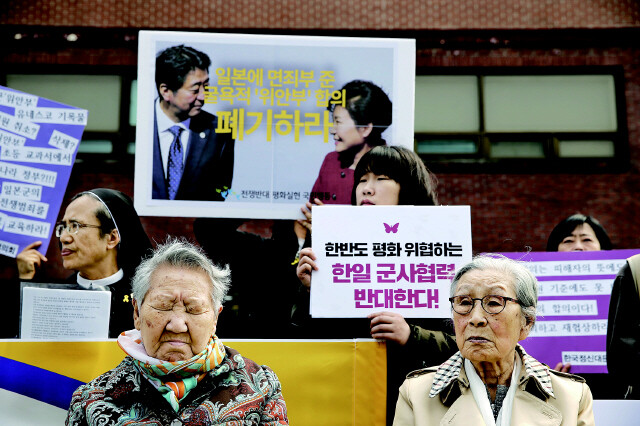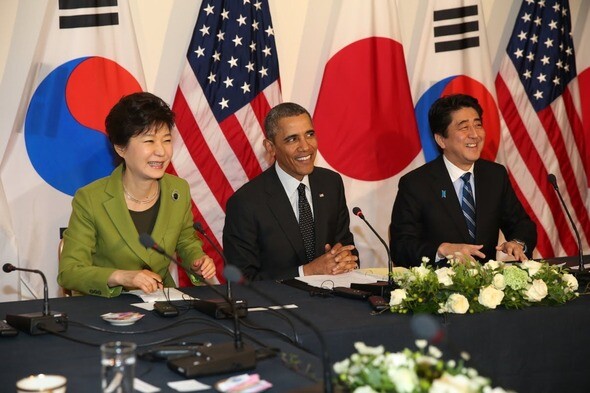hankyoreh
Links to other country sites 다른 나라 사이트 링크
At Nuclear Security Summit, Pres. Park to meet with leaders of US, China, Japan

The Nuclear Security Summit, which will take place in Washington, D.C., from Mar. 31 to Apr. 1, offers the leaders of South Korea, the US, China and Japan their first opportunity to convene since North Korea’s fourth nuclear test. During a series of meetings, these leaders will discuss how to respond to North Korea‘s nuclear program.
One pressing question is how this series of bilateral summits - which come about one month after the UN Security Council adopted Resolution No. 2270 - will affect state of affairs around the Korean Peninsula and how to deal with North Korea’s nuclear weapons.
In one form or another, there will have to be some kind of compromise between the incompatible approaches taken by South Korea, the US and Japan, which are trying to use tougher sanctions to pressure North Korea into abandoning its nuclear program, and by China, which argues that dialogue and negotiations should be pursued alongside sanctions.
Particularly important is the Mar. 31 summit between US President Barack Obama and Chinese President Xi Jinping. The White House has already said that this will provide an opportunity for constructive solutions on issues about which the two sides disagree and for increased cooperation on a wide range of issues on which their interests coincide.
During an online press conference on Mar. 28, US Assistant Secretary of State for International Security and Nonproliferation Thomas Countryman said that, while the North Korean nuclear issue would not be the “central focus” of the Nuclear Security Summit or of Obama and Xi‘s summit, there would “without question [. . .] be plenty of discussion of North Korea.” The North, Countryman added, is “the most active and provocative threat to security in East Asia today.”
“The two sides will also bring up the issue of the Korean Peninsula,” agreed Chinese Vice Foreign Minister Li Baodong. “China continues to maintain that an effort must be made for denuclearization and that the solution must be found through dialogue and negotiations.”
It remains to be seen to what extent the Xi and Obama will see eye to eye on finding an “exit strategy” to resolve the tensions on the Korean Peninsula, which have been high since Pyongyang carried out its fourth nuclear test, and on the proposal made by Chinese Foreign Minister Wang Yi to hold simultaneous talks about denuclearization and about a peace treaty.
Russian President Vladimir Putin will not be attending this Nuclear Security Summit.

On Mar. 31, South Korean President Park Geun-hye will hold back-to-back bilateral meetings with Obama, Xi and Japanese Prime Minister Shinzo Abe.
Park and Obama will be deliberating ways to cooperate on UNSC Resolution No. 2270 and independent sanctions, and Park and Abe will be discussing how to work together in responding to the North Korean nuclear issue, said Kim Kyou-hyun, Blue House senior secretary for foreign policy and security. Kim added that Park and Xi will talk about strengthening communication between the two countries in regard to the issue of North Korean nuclear weapons.
This suggests that Park will be focusing on toughening sanctions against North Korea in her discussions with Obama and Abe and on narrowing differences in regard to dealing with North Korea in her discussion with Xi.
On Mar. 31, Park and Abe will also attend a trilateral summit meeting hosted by Obama.
“This trilateral meeting is the first to be held since the meeting at The Hague in 2014. Deliberation during the meeting will concentrate on implementing the UN Security Council’s resolution, imposing independent sanctions on North Korea and leading the international community to place pressure on North Korea,” Kim explained.
Since these are the first bilateral and trilateral meetings that Park and Abe will attend since the governments of South Korea and Japan reached the Dec. 28 settlement about the so-called comfort women, another question is how much the two leaders will discuss this settlement during the meetings.
During a phone call with Park on Jan. 7, the day after North Korea‘s fourth nuclear test, Obama praised the Dec. 28 agreement as a just conclusion that would increase South Korea, the US and Japan’s ability to respond to the joint challenge of North Korea’s nuclear testing.
However, considering the fact that debate continues about the Dec. 28 agreement not only on a governmental level but also in the realm of public opinion in South Korea and Japan, the two governments have reportedly decided to keep discussion of the issue to the minimum necessary during the bilateral and trilateral meetings.
By Cho Hye-jung and Lee Je-hun, staff reporters, Yi Yong-in and Kim Oi-hyun, Washington and Beijing correspondents
Please direct questions or comments to [english@hani.co.kr]

Editorial・opinion
![[Column] Has Korea, too, crossed the Rubicon on China? [Column] Has Korea, too, crossed the Rubicon on China?](https://flexible.img.hani.co.kr/flexible/normal/500/300/imgdb/original/2024/0419/9317135153409185.jpg) [Column] Has Korea, too, crossed the Rubicon on China?
[Column] Has Korea, too, crossed the Rubicon on China?![[Correspondent’s column] In Japan’s alliance with US, echoes of its past alliances with UK [Correspondent’s column] In Japan’s alliance with US, echoes of its past alliances with UK](https://flexible.img.hani.co.kr/flexible/normal/500/300/imgdb/original/2024/0419/2317135166563519.jpg) [Correspondent’s column] In Japan’s alliance with US, echoes of its past alliances with UK
[Correspondent’s column] In Japan’s alliance with US, echoes of its past alliances with UK- [Editorial] Does Yoon think the Korean public is wrong?
- [Editorial] As it bolsters its alliance with US, Japan must be accountable for past
- [Guest essay] Amending the Constitution is Yoon’s key to leaving office in public’s good graces
- [Editorial] 10 years on, lessons of Sewol tragedy must never be forgotten
- [Column] A death blow to Korea’s prosecutor politics
- [Correspondent’s column] The US and the end of Japanese pacifism
- [Guest essay] How Korea turned its trainee doctors into monsters
- [Guest essay] As someone who helped forge Seoul-Moscow ties, their status today troubles me
Most viewed articles
- 1[Column] The clock is ticking for Korea’s first lady
- 2Samsung barricades office as unionized workers strike for better conditions
- 3After 2 months of delayed, denied medical care, Koreans worry worst may be yet to come
- 4[Correspondent’s column] In Japan’s alliance with US, echoes of its past alliances with UK
- 5[Column] Has Korea, too, crossed the Rubicon on China?
- 6Hong Se-hwa, voice for tolerance whose memoir of exile touched a chord, dies at 76
- 7[Photo] Smile ambassador, you’re on camera
- 8All eyes on Xiaomi after it pulls off EV that Apple couldn’t
- 9[Guest essay] How Korea turned its trainee doctors into monsters
- 10US overtakes China as Korea’s top export market, prompting trade sanction jitters